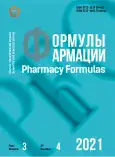Biodizine as a civilizational challenge of modern pharmaceuticals
- Authors: Tyukavin A.I.1, Arseniev N.А.1, Studneva M.A.2,3, Medvedeva V.S.4, Suchkov S.V.2,5,3
-
Affiliations:
- Saint Petersburg State Chemical and Pharmaceutical University
- Moscow State University of Food Production
- European Association for Predictive, Preventive and Personalized Medicine, EU
- I.M. Sechenov First Moscow State Medical University (Sechenov University)
- A. I. Yevdokimov Moscow State University of Medicine and Dentistry
- Issue: Vol 3, No 4 (2021)
- Pages: 108-117
- Section: Actual problems: discussion tribune
- URL: https://journal-vniispk.ru/PharmForm/article/view/99672
- DOI: https://doi.org/10.17816/phf99672
- ID: 99672
Cite item
Full Text
Abstract
The review discusses the role of pharmaceutical and drug design methodology in the development of the high-tech segment of the development and production of original drugs for personalized and precision medicine (PPM). Topical issues of using predictively personalized tools for precision medicine in pharmaceuticals are highlighted. New opportunities and prospects for increasing the effectiveness of drugs in various fields of medicine created on the basis of pharmaceutical design are shown. Discussed are original approaches to standardization and reproducibility of the effects of new drugs at the preclinical stage using microfluidic bioconstructs – organ-on-a-chip systems. The relevance of improving university curricula for training specialists in the field of molecular drug design (drug design), harmonized with dynamically developing biotechnologies in pharmaceuticals, as well as the needs of domestic healthcare in original medicines for PPM, is shown.
Full Text
##article.viewOnOriginalSite##About the authors
Alexander I. Tyukavin
Saint Petersburg State Chemical and Pharmaceutical University
Email: alexander.tukavin@pharminnotech.com
SPIN-code: 8476-5366
Doctor of Medicine (MD), Professor, Head of the Department to Physiology and Pathology
Russian Federation, Saint PetersburgNikolay А. Arseniev
Saint Petersburg State Chemical and Pharmaceutical University
Email: nikolay.arseniev@pharminnotech.com
SPIN-code: 9038-7623
Ph.D in Biology, Associate Professor of the Department to Physiology and Pathology
Russian Federation, Saint PetersburgMaria A. Studneva
Moscow State University of Food Production; European Association for Predictive, Preventive and Personalized Medicine, EU
Email: maria.studneva@gmail.com
Assistant of the Department to Personalized Medicine, Precision Nutrition and Biodesign
Russian Federation, Moscow; BrusselsVeronika S. Medvedeva
I.M. Sechenov First Moscow State Medical University (Sechenov University)
Email: med_nika2000@mail.ru
Student
Russian Federation, MoscowSergey V. Suchkov
Moscow State University of Food Production; A. I. Yevdokimov Moscow State University of Medicine and Dentistry; European Association for Predictive, Preventive and Personalized Medicine, EU
Author for correspondence.
Email: ssuchkov57@gmail.com
SPIN-code: 7052-7335
Doctor of Medicine (MD), Professor, Head of the Department to Personalized Medicine, Professor of the Department of Clinical Allergology and Immunology
Russian Federation, Moscow; Moscow; BrusselsReferences
- Suchkova S. V., ed. Osnovy personalizirovannoj i precizionnoj mediciny. Uchebnik dlja medicinskih vuzov i fakul’tetov Kazan: ID MedDok; 2021. 628 p. (In Russ.).
- Tyukavin A. I., ed. Patologija: uchebnik. Moscow: INFRA-M; 2021. 844 p. (In Russ.).
- Chaplenko A. A., Vlasov V. V., Gildeeva G. N. Innovative medicines on the Russian pharmaceutical market: key players and main directions of development. Remedium. 2020;(10):4–9. https://doi.org/10.21518/1561-5936-2020-10-4-9 (In Russ.).
- The Pharma Media: BioMedTracker and Cortellis databases.
- Okminyan G. F., Latyshev O. Yu., Kiseleva E. V., et al. Basal insulin evolution: from simple to more complex. Endokrinologiya: novosti, mneniya, obuchenie = Endocrinology: News, Opinions, Training. 2021;10(1):18–25. https://doi.org/10.33029/2304-9529-2021-10-1-18-25 (In Russ.).
- Dedov I. I., Peterkova V. A., Kuraeva T. L., et al. Insulinovaja pompa (pomoshh’ vrachu dlja jeffektivnogo upravlenija diabetom. Moscow; 2014. 126 p.
- Green A., Silver P., Collins J., et al. Toehold Switches: De-Novo-Designed Regulators of Gene Expression. Cell. 2014;159(4):925–939. http://dx.doi.org/10.1016/j.cell.2014.10.002
- Belousov K. I., Evtrapov A. A., Kuhtevich I. V., et al. Osnovy nanotehnologij. Chast’ 2. Kapel’naja mikrofljuidika. Uchebnoe posobie. Saint Petersburg: ITMO University; 2015. 56 p.
- Afonicheva P. K., Bulyanitsa A. L., Evstrapov A. A. «Organ-on-a-chip» – materials and methods of creation. Nauchnoe priborostroenie = Scientific Instrumentation. 2019;29(4):3–18.
- Gijzen L., Marescotti D., Raineri E., et. al. An Intestine-on-a-Chip Model of Plug-and-Play Modularity to Study Inflammatory Processe. SLAS TECHNOLOGY: Translating Life Sciences Innovation. 2020;25(6):585–597. https://doi.org/10.1177/2472630320924999
Supplementary files





















